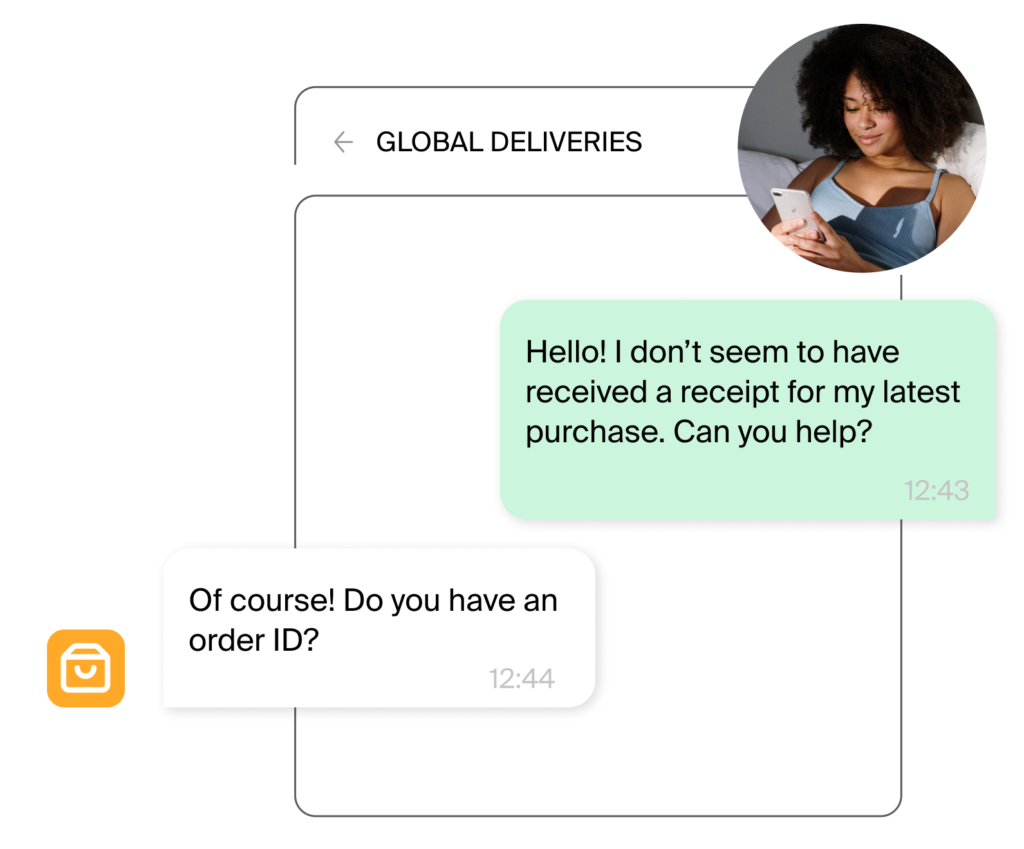As today’s consumers have an almost limitless choices when seeking to buy products and services, one of the best ways for businesses to differentiate themselves is to create personalised, interactive, and intimate conversational experiences. To this end, the global spend on conversational commerce channels is expected to reach $290 billion by 2025.
With 54% of adults saying they find traditional forms of communication frustrating, it’s clear that one-way modes of communication are no longer enough. Consumers yearn for real-time, two-way conversations that enable seamless interactions and customised engagement. Thankfully, messaging platforms such as WhatsApp, Viber, and SMS have emerged as powerful channels for brands to establish meaningful and reciprocal connections with their customers. This blog delves into the significance of two-way conversations and explores the benefits they bring to both customers and brands. We will also look at the features of each platform and provide insights on how brands can effectively leverage them.
Download Now: 5 Top Customer Engagement Trends for 2023 & Beyond
Why Customers Love Bi-directional Messaging
In today’s competitive market, businesses that understand and cater to their customers’ unique individual needs stand out by making customers feel heard, understood and valued. Two-way conversations enable a new level of personalisation, allowing companies to offer tailored recommendations, exclusive offers, and highly relevant personalised content. If you’re wondering how important this type of personalisation is, bear in mind that recent McKinsey research shows that a massive 71% of consumers expect companies to deliver personalised interactions and 76% of those get frustrated when this doesn’t happen. By engaging customers in meaningful conversations, brands can combat this frustration and create memorable experiences that foster loyalty and advocacy.

Moreover, these messaging platforms provide customers with convenient channels to initiate the conversation with their favourite brands themselves. Whether they have queries, issues, or feedback, customers appreciate the immediacy and accessibility of two-way conversations. Real-time support enhances customer satisfaction and builds trust in the brand, creating a hyper-personalised and extremely positive CX.
Another advantage of two-way conversations is the empowerment it gives customers. By seeking customer feedback and opinions, brands demonstrate a commitment to understanding and meeting customer expectations. This collaborative approach builds stronger relationships and strengthens brand loyalty.
How Two-way Messaging Benefits Organisations
Two-way conversations offer several benefits for businesses as well. Firstly, they foster deeper connections with customers, leading to increased engagement rates. Through interactive discussions, brands can gather valuable insights about customer preferences, pain points, and emerging trends. These insights enable brands to make data-driven decisions and refine their marketing strategies, ultimately driving business growth.
Furthermore, real-time communication on messaging platforms allows brands to promptly address customer concerns and resolve issues efficiently. Exceptional customer service builds a reputation for reliability and responsiveness, leading to increased customer satisfaction and loyalty. Businesses that embrace two-way conversations demonstrate a customer-centric approach, setting themselves apart from competitors and positioning themselves as industry leaders.
A/B testing is a powerful marketing technique that allows organizations to experiment with different versions of their messaging or offers to determine which one resonates better with their audience. Two-way conversations present an excellent opportunity for organizations to conduct A/B testing effectively. By engaging in personalized conversations with customers through messaging apps like WhatsApp, Viber, and SMS, brands can send different variations of their messages or offers to segmented groups of customers. They can then analyse the responses, feedback, and engagement levels to identify the most effective approach. This real-time feedback loop enables organizations to gather valuable insights, refine their marketing strategies, and optimize their messaging for maximum impact, resulting in improved customer engagement, conversion rates, and overall marketing effectiveness.
Two-Way Communications on Key Platforms
To enable effective two-way conversations, organisations can leverage the unique features of each of the platforms that are most popular with their target consumers. They can utilise the special features of WhatsApp Business API, such as automated replies, chat templates, and message tags. By integrating with customer relationship management (CRM) systems, brands can focus on loyalty building personalised responses, whilst automating more routine interactions for speed and efficiency.

Viber Business Messaging provides brands with the opportunity to engage in two-way conversations with customers. Viber enables AI chatbot integration, rich media messaging, community spaces and loyalty programs, allowing brands to create immersive experiences, deliver targeted promotions, and ensure instant support to create a genuine bi-directional rapport with customers on an individual and group basis.
Despite the rise of messaging apps, SMS remains a popular and effective medium for two-way communications. A 2023 Mobilesquared report reveals that SMS is a preferred communication channel for 66% of respondents, taking second place right after WhatsApp with 73% of responses. Brands can leverage the benefits of shortcodes, keywords, and automated responses to engage customers in interactive conversations. SMS also offers the advantage of reaching a wide customer base, regardless of their smartphone capabilities or internet connectivity.
Managing Bi-directional Messaging
For managing multiple messaging apps, and data, and ensuring a seamless customer experience, a Communication Platform as a Service (CPaaS) is a valuable solution. CPaaS provides a unified platform that integrates all the most popular messaging apps like WhatsApp, Viber, and SMS, allowing brands to centralise their communications and streamline their operations. CPaaS provides a single interface to manage multiple messaging apps, eliminating the need for separate tools or platforms. This centralised approach simplifies operations, reduces complexity at scale, improves insights and analytics, strengthens security and compliance, and saves time and resources for organisations. According to recent CPaaS research by Mobile Squared, in 2020, 88% of total CPaaS spend was on one-way channels, with the remaining 12% on two-way engagement channels. By 2022, spend on two-way engagement channels had increased to 19.9%. This is expected to increase to 31.2% by 2026.
Cross-sector Use Cases and Benefits
Two-way conversations have numerous use cases that benefit organisations in different sectors. eCommerce brands can leverage them to send personalised offers based on customer preferences, provide real-time order updates, respond to customer queries about products, and gather feedback to enhance the online shopping customer experience (CX). This leads to increased customer satisfaction, repeat purchases, increased upselling and cross-selling and higher overall conversion rates, whilst also boosting loyalty and referrals. Similarly, in retail, by engaging in two-way conversations, brands can send tailored recommendations, assist customers in finding products, and offer exclusive discounts to VIP customers. This personalised approach enhances customer engagement, drives footfall to physical stores, reduced friction between online and bricks and mortar shopping, and boosts sales.
Two-way conversations allow financial institutions to provide real-time account updates, address customer-initiated queries regarding transactions or account information and offer personalised financial advice when requested – which is particularly useful in times of economic disruption. This fosters trust, strengthens customer relationships, and promotes loyalty.
Summing Up Two-way Business Messaging
As customers increasingly seek hyper-personalised and interactive experiences, organisations must adapt to meet their evolving expectations. Two-way conversations facilitated by messaging platforms like WhatsApp, Viber, and SMS, and managed centrally with CPaaS, offer immense opportunities for businesses to engage customers in meaningful conversations. By leveraging the benefits of personalisation, convenience, empowerment, and collaboration, brands can create memorable experiences and foster longer lasting customer relationships. Moreover, two-way communications provide brands with invaluable insights, improved customer service, enhanced brand image, and a competitive edge. Embracing the power of two-way conversations is no longer an option but a necessity for forward-thinking brands that aim to thrive in today’s dynamic marketplace during the current cost-of-living crisis and beyond.

